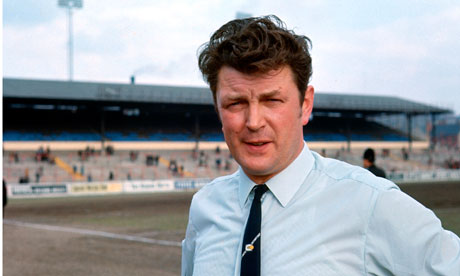
Alec Weeks tackled early TV sport problems such as the colour of footballs.
The television producer and director Alec Weeks, who has died aged 84, was a pioneer of the BBC's sports coverage and set a benchmark for standards over three decades. He was responsible for the television presentation of 16 FA Cup finals, eight World Cup tournaments, four summer and four winter Olympics, six European and world athletics championships, and four Commonwealth Games. He had no doubt about what his job was: "Put the viewer in the best seat in the grandstand and keep them glued there."
Weeks was no stereotypical BBC executive. He once told an astonished chairman of the corporation who wandered into his outside-broadcast van: "Keep the noise down, cocker, or you're in the park." The commentators, camera operators and engineers with whom he worked recalled his sometimes colourful language, along with firm direction, praise and criticism.
He was driven by a desire for perfection and to beat the opposition. While the BBC believed it had an exclusive agreement for interviews with Manchester City footballers after the 1969 FA Cup final, ITV's Peter Lorenzo rushed to talk to them about their victory over Leicester City. "Move in," Weeks shouted to his team. "Stop those bastards. Use any means possible." One newspaper headline read: "BBC v ITV punch-up on Wembley pitch."
Born in Watford, Hertfordshire, where his father worked in the electrical trade, Weeks was 14 when, in 1941, his school was bombed and he took a job as an office junior with the BBC. He was first based at Aldenham House, Hertfordshire, the corporation's wartime headquarters for overseas broadcasts.
Two years later he became a junior programme engineer at Broadcasting House, in London. He played records and created "spot effects" – noises using items such as drums, motor horns and bags of gravel – for dramas and entertainment shows that included ITMA (It's That Man Again). He eventually worked as an engineer on the full range of programmes, including news and talks, and Children's Hour. His career was interrupted in 1944 for RAF service, during which he discovered a talent for boxing and sparred with Randolph Turpin, who went on to win the world middleweight title.
Weeks rejoined the BBC in 1948 and was soon working as a studio manager. However, with an avid interest in sport, he was frequently seconded to the outside broadcast department as a programme assistant. Then, in 1955, came a plum job in charge of overseas sport. Boosted by what was regarded as his impressive coverage for radio of the 1958 Commonwealth Games, held in Cardiff, he landed a job in television.
Weeks started in Manchester as a production assistant before becoming a floor manager, then director. His first outside-broadcast directing came with coverage of greyhound racing for the national magazine show Sportsview. He moved back to London as a studio producer and director on the live Saturday afternoon programme Grandstand (1961-65) and became a producer on Match of the Day when the football highlights show began on the newly launched BBC2 in 1964.
Weeks directed matches himself from 1965 and was the programme's executive producer from 1965 until 1980. This meant that he saw its switch to BBC1 in 1966, with the impetus of England hosting the World Cup – for which he directed the final – and the transition to colour in 1969.
Weeks tackled some of the initial problems of covering football, such as asking clubs to use white or bright-yellow balls for black-and-white television, and providing brandy to camera operators at half-time and full-time during the winter. His coverage for the 1976 FA Cup final, when Southampton beat Manchester United – won a Bafta for best outside broadcast.
Weeks was a producer of Olympics coverage from Innsbruck in 1964 to Los Angeles in 1984, which included having to contend with how best to present pictures directed by foreign television networks. He retired in 1987.
In 2006, his autobiography, Under Auntie's Skirts: The Life and Times of a BBC Sports Producer, was published. He also wrote a novel, The Loneliest Place (2008), the story of a wartime boxer.
Weeks is survived by his second wife, Pamela Bailey, whom he married in 1954, and a daughter, Diane, from his first marriage, to Joyce Tew, which ended in divorce.
• Alec Percy Weeks, television producer and director, born 2 February 1927; died 30 April 2011
No comments:
Post a Comment